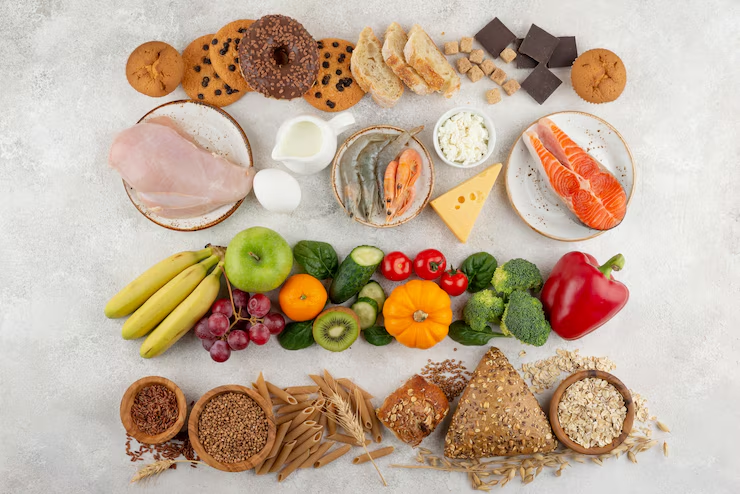Introduction: Why Blood Sugar Matters More Than You Think
Blood sugar, or glucose, is a vital component of your overall health. It serves as the primary fuel source for the body’s cells and is essential for brain function, muscle performance, and organ health. But when blood sugar levels are too high or too low, it can lead to serious health issues ranging from fatigue and irritability to life-threatening conditions like diabetes and heart disease.
In today’s world, with processed foods, sugary beverages, sedentary lifestyles, and chronic stress, blood sugar imbalance has become alarmingly common. According to the World Health Organization, hundreds of millions of people worldwide are affected by blood sugar-related disorders, particularly type 2 diabetes.
This article will help you fully understand blood sugar, how it works, what causes imbalances, and most importantly, provide the Top 8 tips for managing it naturally. Whether you want to prevent diabetes, lose weight, improve focus, or simply feel better every day, this guide is for you.
What Is Blood Sugar?

Blood sugar, also known as blood glucose, refers to the amount of sugar (glucose) present in your bloodstream at any given time. Glucose is the main source of energy for your body’s cells and comes primarily from the carbohydrates you eat. After digestion, carbohydrates are broken down into glucose, which then enters the bloodstream and is transported to your cells with the help of a hormone called insulin, produced by the pancreas.
Maintaining the right balance of blood sugar is essential for your health. If your bloodsugar is too high (a condition called hyperglycemia), it can damage blood vessels, nerves, and organs over time, leading to serious health issues such as type 2 diabetes, heart disease, kidney problems, and vision loss. On the other hand, if your blood sugar drops too low (hypoglycemia), it can cause dizziness, fatigue, confusion, and even fainting.
Normal fasting bloodsugar levels typically range between 70 to 99 mg/dL, while levels above 126 mg/dL may indicate diabetes. Your body naturally regulates bloodsugar throughout the day, but this balance can be disrupted by poor diet, lack of exercise, stress, illness, or certain medications.
Understanding bloodsugar and how it works is the first step toward better health. By learning how your body responds to food and lifestyle choices, you can take proactive steps to maintain stable glucose levels and prevent chronic disease. It’s not just about avoiding sugar—it’s about creating balance.
Normal Blood Sugar Levels:
- Fasting (no food for 8+ hours): 70 to 99 mg/dL
- 1-2 hours after meals: Less than 140 mg/dL
- Prediabetes: Fasting between 100-125 mg/dL
- Diabetes: Fasting 126 mg/dL or higher
What Causes Blood Sugar Imbalance?
Many factors can cause bloodsugar to spike or crash:
- Unhealthy Diet: Refined carbs, sugars, and processed foods raise blood sugar quickly.
- Sedentary Lifestyle: Physical inactivity decreases insulin sensitivity.
- Chronic Stress: Increases cortisol, which raises blood sugar.
- Sleep Deprivation: Reduces insulin sensitivity and increases hunger.
- Overeating or Skipping Meals: Can lead to sudden spikes or drops in glucose.
- Medications or Illnesses: Some drugs and diseases can impact glucose regulation.
Symptoms of High and Low Blood Sugar
Signs of high blood sugar (hyperglycemia):
- Excessive thirst
- Frequent urination
- Fatigue
- Blurred vision
- Headaches
Signs of low blood sugar (hypoglycemia):
- Shakiness or trembling
- Sweating
- Rapid heartbeat
- Dizziness
- Confusion
- Irritability
Understanding these symptoms helps you respond quickly and appropriately to imbalances.
Top 8 Tips to Control and Optimize Your Blood Sugar
1. Adopt a Low-Glycemic Diet

Low-glycemic foods release glucose slowly, keeping bloodsugar stable. These foods play a crucial role in maintaining balanced energy levels and reducing the risk of blood sugar spikes. They help prevent the sudden crashes that often follow high-glycemic meals, which can lead to fatigue and cravings.
Examples of low-glycemic foods include whole grains like quinoa and oats, legumes such as lentils and black beans, leafy greens, and fruits like apples and berries. These foods are rich in fiber, which slows digestion and promotes gradual sugar absorption into the bloodstream. Including them regularly in your meals supports consistent bloodsugar levels throughout the day.
For those managing diabetes or aiming for long-term health, incorporating more low-glycemic foods is an effective strategy. A balanced diet focused on these foods can reduce the risk of insulin resistance, promote weight control, and improve overall blood sugar management for a healthier lifestyle.:
- Whole grains
- Leafy vegetables
- Beans and lentils
- Berries
- Healthy fats like avocado and olive oil
Avoid high-glycemic items such as white bread, sugary snacks, and soda.
Pro Tip: Combine protein, fiber, and healthy fats with carbs to reduce sugar spikes.
2. Prioritize Protein and Fiber
Protein and fiber play a crucial role in maintaining balanced bloodsugar levels. These nutrients slow down digestion, leading to a more gradual release of glucose into the bloodstream. This process helps prevent sudden spikes and crashes in bloodsugar, which can cause energy dips and cravings.
Including high-fiber foods like lentils, oats, and leafy greens in your meals supports better glucose control. Likewise, protein sources such as eggs, chicken, tofu, and nuts contribute to satiety and help you feel full for longer periods. By combining both protein and fiber in each meal, you can reduce hunger and maintain steady energy throughout the day.
Stabilizing bloodsugar is essential for overall health, especially for those aiming to prevent or manage diabetes. Prioritizing these nutrients in your daily diet can improve your metabolic function, reduce cravings, and support long-term wellness without the need for drastic dietary restrictions.
Great sources:
- Chicken, fish, tofu
- Eggs
- Legumes
- Chia seeds, flaxseeds
- Vegetables
Aim for 25-35 grams of fiber daily and include protein in every meal.
3. Exercise Regularly
Movement improves insulin sensitivity and helps glucose enter cells for energy.
Effective exercises:
- Walking (especially after meals)
- Resistance training
- HIIT workouts
- Yoga and stretching
Aim for at least 150 minutes of moderate-intensity activity weekly.
4. Stay Hydrated

Staying properly hydrated plays a critical role in maintaining balanced blood sugar levels. Water supports essential body functions, especially kidney function, which is responsible for filtering and removing excess glucose from the bloodstream through urine. When you’re well-hydrated, your kidneys can operate efficiently, helping regulate blood sugar and keeping your body in balance.
Dehydration, on the other hand, can significantly impact blood sugar control. When the body lacks sufficient fluids, the blood becomes more concentrated, leading to higher blood sugar readings. This can be especially problematic for individuals with insulin resistance or diabetes, as concentrated glucose in the blood can worsen symptoms like fatigue, thirst, and frequent urination. Without enough water, glucose builds up in the bloodstream, making it harder for your system to stay balanced.
To support healthy blood sugar levels, aim to drink at least 8–10 glasses of water daily. You can also stay hydrated by consuming water-rich foods such as cucumbers, watermelon, and oranges. Avoid sugary beverages like soda, energy drinks, and fruit juices, which can cause blood sugar spikes. Instead, opt for herbal teas, coconut water, or simply infuse your water with lemon, mint, or berries for flavor. Making hydration a daily habit is a simple yet powerful way to support your blood sugar and overall health naturally.
Tips:
- Drink at least 8-10 cups of water daily
- Avoid sugary drinks and alcohol
- Add lemon, cucumber, or mint to flavor water naturally
5. Get Consistent, Restful Sleep
Poor sleep interferes with glucose metabolism and appetite hormones. When you don’t get enough rest, your body struggles to use insulin efficiently, which can lead to elevated blood sugar levels. Even a few nights of inadequate sleep may reduce insulin sensitivity, making it harder for your cells to absorb glucose from the bloodstream. As a result, your blood sugar may stay high longer than it should, increasing the risk of insulin resistance and type 2 diabetes over time.
Sleep also affects hormones that control hunger—ghrelin and leptin. When you’re sleep-deprived, ghrelin (which stimulates appetite) increases, while leptin (which signals fullness) decreases. This imbalance often leads to cravings for high-sugar, high-carb foods, further worsening blood sugar control. People with poor sleep patterns are more likely to overeat and gain weight, both of which negatively impact blood sugar regulation.
To support healthy blood sugar levels, aim for 7–9 hours of quality sleep each night. Create a bedtime routine, reduce screen time before bed, and maintain a cool, dark, quiet sleeping environment. Improving your sleep is one of the most underrated yet powerful strategies for managing blood sugar naturally and improving your overall health. Prioritizing rest may help you wake up with more energy and better glucose control.
Sleep better by:
- Following a routine
- Avoiding screens before bed
- Keeping the bedroom cool and dark
Aim for 7-9 hours of quality sleep per night.
6. Manage Stress Effectively
Stress is more than just a mental or emotional burden—it has a powerful impact on your physical health, especially when it comes to blood sugar regulation. When you’re under stress, your body releases cortisol, a hormone that triggers the liver to release glucose into the bloodstream. This response is part of the body’s natural “fight or flight” reaction, meant to provide quick energy. However, chronic stress means this process happens repeatedly, leading to consistently elevated blood sugar levels.
High cortisol levels over time can disrupt insulin function, making it harder for your body to absorb glucose efficiently. As a result, you may begin to experience symptoms of blood sugar imbalance such as fatigue, cravings, or even weight gain—especially around the midsection. This sets the stage for long-term health issues like insulin resistance and type 2 diabetes.
Additionally, stress often leads to emotional eating, where sugary or high-carb comfort foods become a go-to coping mechanism. These choices can cause rapid blood sugar spikes followed by crashes, leaving you feeling drained and irritable. Managing stress through healthy practices like meditation, exercise, deep breathing, or even short nature walks can greatly support your blood sugar health and help you stay balanced, both emotionally and physically.
Reduce stress with:
- Meditation
- Deep breathing
- Nature walks
- Creative hobbies
Practice stress relief daily, even for 10 minutes.
7. Monitor Your Blood Sugar
Regular monitoring helps you understand how your body responds to food, exercise, and lifestyle choices. Tracking your blood sugar levels provides valuable insight into how your daily habits affect your glucose control. Whether you’re dealing with diabetes, prediabetes, or simply aiming to maintain optimal health, checking your blood sugar can help you make smarter decisions and avoid unexpected spikes or crashes.
By observing patterns in your blood sugar readings, you can identify which foods cause the biggest changes, how different types of physical activity influence your glucose levels, and how stress or sleep impacts your metabolism. This empowers you to take proactive steps toward better health. Tools like a glucometer or continuous glucose monitor (CGM) can make this process easier and more accurate.
Incorporating blood sugar monitoring into your routine supports long-term success in managing your health. It keeps you informed, helps set realistic goals, and motivates consistency. Over time, these small, mindful practices can improve your energy, reduce your risk of complications, and give you a greater sense of control. Monitoring isn’t just for those with medical conditions—it’s a helpful strategy for anyone committed to a healthier, more balanced lifestyle.
Tools to use:
- Fingerstick glucometer
- Continuous Glucose Monitor (CGM)
- Food and mood diary
Tracking helps identify patterns and triggers.
8. Consider Natural Supplements

Some supplements support healthy blood sugar levels by improving insulin sensitivity, reducing glucose absorption, and lowering inflammation. While they aren’t a substitute for a balanced diet and lifestyle, they can play a supportive role in maintaining stable blood sugar. Natural compounds like cinnamon, berberine, and chromium are among the most researched and effective for blood sugar regulation.
Cinnamon extract has been shown to mimic insulin and enhance glucose uptake by cells. Berberine, a plant-based compound, helps regulate blood sugar by activating an enzyme called AMPK, which improves metabolism. Chromium, an essential mineral, supports insulin function and aids in carbohydrate metabolism. Other beneficial nutrients include magnesium and alpha-lipoic acid, which help lower oxidative stress and improve insulin sensitivity.
Before adding any supplement to your routine, it’s essential to consult with a healthcare professional, especially if you’re on medication. While supplements can enhance your blood sugar management efforts, they work best when combined with a healthy diet, regular exercise, and stress reduction. Consistency is key to seeing long-term results. By making informed choices and using trusted supplements wisely, you can take an extra step toward stabilizing your blood sugar and supporting your overall well-being:
- Cinnamon: May enhance insulin sensitivity
- Berberine: Shown to lower glucose levels
- Chromium: Helps with carb metabolism
- Magnesium: Supports insulin function
Always consult your doctor before starting supplements.
Benefits of Blood Sugar Management
Keeping your glucose stable leads to:
- Sustained energy
- Fewer sugar cravings
- Better focus and memory
- Reduced inflammation
- Easier weight loss
- Improved heart, kidney, and eye health
- Better sleep and mood
These benefits compound over time, drastically improving your overall quality of life.
Long-Term Strategies for Blood Sugar Health
To maintain healthy levels:
- Cook meals at home
- Read food labels
- Eat on a regular schedule
- Avoid crash diets or skipping meals
- Get regular checkups
- Build a support system
Consistency, not perfection, is the secret to long-term success.
Common Myths About Blood Sugar
Myth 1: Only diabetics need to monitor blood sugar. Truth: Everyone benefits from balanced glucose levels.
Myth 2: All carbs are bad. Truth: Whole carbs like oats and lentils are nutritious and blood-sugar-friendly.
Myth 3: Fruit raises blood sugar too much. Truth: Whole fruits contain fiber and nutrients that moderate sugar release.
FAQs About Blood Sugar
Q: What’s the best time to check my blood sugar? A: Before meals and 1-2 hours after meals can show how your body processes food.
Q: Can losing weight improve blood sugar? A: Yes, even 5-10% weight loss improves insulin sensitivity.
Q: Should I avoid carbs completely? A: No. Focus on quality and quantity. Balance is key.
Q: Are artificial sweeteners safe? A: Some are safe in moderation, but whole food alternatives are usually better.
Final Thoughts: Take Charge of Your Blood Sugar
Managing your blood sugar isn’t just a concern for people with diabetes—it’s a vital part of overall health for everyone. Blood sugar levels affect your mood, energy, metabolism, weight, and even your risk for chronic illnesses like type 2 diabetes, heart disease, and cognitive decline. By becoming more aware of how your lifestyle choices influence your glucose levels, you empower yourself to make better decisions and protect your long-term health.
The great news is that you don’t need to make drastic changes overnight. Small, consistent steps—like eating more low-glycemic foods, exercising daily, drinking plenty of water, and managing stress—can have a powerful cumulative effect. Tracking your progress, whether through a glucose monitor, food journal, or fitness tracker, helps you stay accountable and identify what works best for your body. Incorporating natural supplements, with the guidance of a healthcare provider, can also provide extra support in your journey toward balanced blood sugar.
Remember, there’s no “perfect” way to manage blood sugar. The key is finding sustainable habits that fit your lifestyle. Whether it’s choosing whole grains over refined carbs, taking a brisk walk after dinner, or making sleep a priority, every effort counts. Over time, these efforts help reduce sugar cravings, stabilize energy levels, and prevent dangerous blood sugar spikes and crashes.
Taking charge of your blood sugar means taking charge of your life. It’s about creating a lifestyle that supports not just physical health, but mental clarity, emotional balance, and vitality. You deserve to feel your best—and by being proactive and consistent, you absolutely can. Don’t wait for a diagnosis or a wake-up call. Start now with small, realistic goals, and build momentum one healthy habit at a time.
Start with one tip. Then another. Build momentum, and become the healthiest version of yourself.
Your journey to balanced blood sugar starts now.





